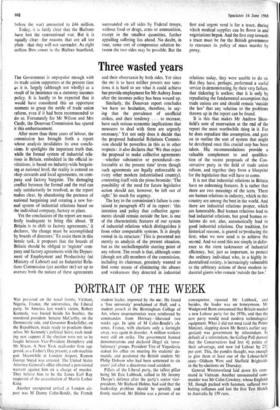Three wasted years
The Government is unpopular enough with its trade union supporters at the present time as it is, largely (although not wholly) as a result of its insistence on a statutory incomes policy. It is hardly to be expected that it would have considered this an opportune moment to grasp the nettle of trade union reform, even if it had been recommended to do so. Fortunately for Mr Wilson and Mrs Castle, the Donovan Commission has spared it this embarrassment.
After more than three years of labour, the commission has brought forth a report whose analysis invalidates its own conclu- sions. It spotlights the important truth that, while the formal system of industrial rela- tions in Britain, embedded in the official in- stitutions, is based on industry-wide bargain- ing at national level, the reality is centred on shop stewards and local agreements, on com- pany and factory bargains. The damaging conflict between the formal and the real can only satisfactorily be resolved, as the report makes clear, by abandoning the pretence of national bargaining and creating a new for- mal system of industrial relations based on the individual company, factory or plant.
Yet the conclusions of the report are mani- festly inadequate to bring this about. If Britain is to shift to factory agreements,' it declares, `the change must be accomplished by boards of directors.' To assist them in this heroic task, it proposes that the boards of Britain should be obliged to `register' com- pany and factory agreements with the Depart- ment of Employment and Productivity (lie Ministry of Labour) and an Industrial Rela- tions Commission (yet another lac) set up to oversee both the nature of these agreements and their observance by both sides. Yet since the tRC is to have neither powers nor sanc- tions it is hard to see what it could achieve bar provide employment for Mr Aubrey Jones after the incomes policy has been wound up.
Similarly, the Donovan report concludes `we have no hesitation, therefore, in say- ing that the prevalence of unofficial strikes, and their tendency . . . to increase, have such serious economic implications that measures to deal with them are urgently necessary.' Yet not only does it decide that the proposed Industrial Relations Commis- sion should be powerless in this as in other respects : it also declares that `We thus reject the proposal to make collective agreements —whether substantive or procedural—en- forceable at the present time' (even though such agreements are legally enforceable in every other modern industrialised country), contenting itself with the pious bromide: `The possibility of the need for future legislative action should not, however, be left out of sight.' So much for urgency.
The key to the commission's failure is con- tained in paragraph 471 of its report: 'this intention and policy that collective agree- ments should remain outside the law, is one of the characteristic features of our system of industrial relations which distinguishes it from other comparable systems. It is deeply rooted in its structure.' This is presented not merely as analysis of the present situation, but as the unchallengeable starting point of any reform. The result is that, although some (though not all) members of the commission, including its chairman, genuinely wanted to find some means of eliminating the abuses and weaknesses they detected in industrial relations today, they were unable to do so. But they have, perhaps; performed a useful service in demonstrating, by their very failure, that tinkering is useless; that it is only by repudiating the fundamental assumption that trade unions are and should remain 'outside the law' that any solution to the problems thrown up in the report can be found.
It is this that makes Mr Andrew Shon- field's note of reservation at the end of the report the most worthwhile thing in it. For he does repudiate this assumption, and goes on to outline the sort of system that might be developed once this crucial step has been taken. His recommendations provide a valuable complement to and qualifica- tion of the recent proposals of the Con- servative party in the field of trade union reform, and together they form a blueprint for the legislation that will have to come.
It is not that industrial relations in Britain, have no redeeming features. It is rather that there are two meanings of the term. There. are human relations in industry, which in this country are among the best in the world. And there are industrial relations proper, which are lamentable. Bad human relations lead to bad industrial relations, but good human re- lations do not, alas, automatically lead to good industrial relations. Our tradition, for historical reasons, is geared to 'producing the first; what we now need is to achieve the second. And we need this not simply in defer- ence to the stern taskmaster of industrial efficiency, but, just as important, to protect the ordinary individual who, in a highly in- dustrialised society, is increasingly vulnerable to the arbitrary actions of these modern in- dustrial giants who remain `outside the law.'










































 Previous page
Previous page